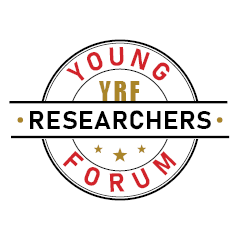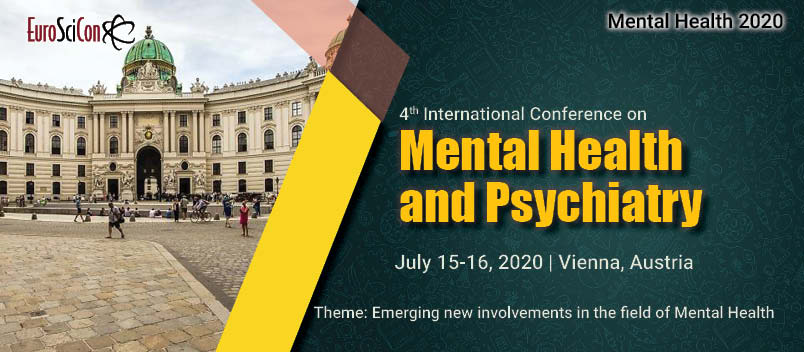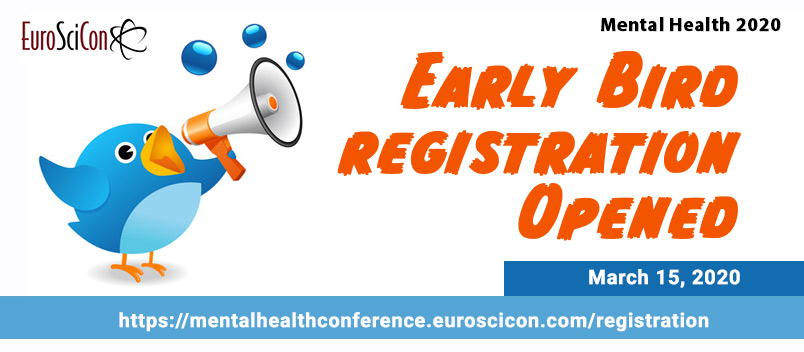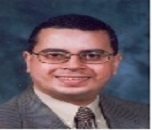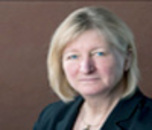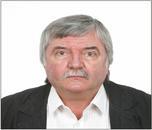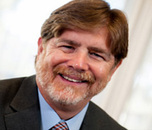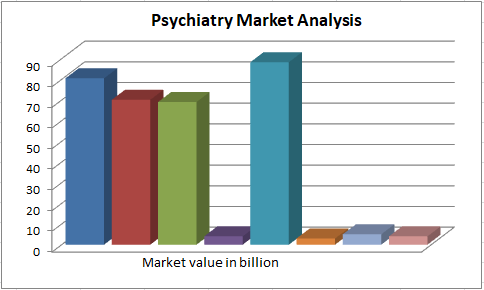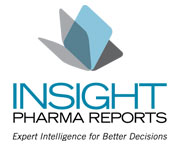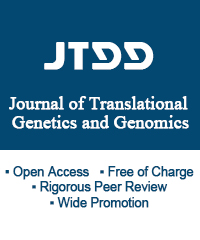MENTAL HEALTH 2020
About Conferences
Mental Health 2020 cordially invites you to the 4th International Conference on Mental Health, which is going to be at Vienna, Austria in the month of July from 15th to 16th, 2020. Mental Health 2020 is the platform where professionals, scientist and renowned people express and share their knowledge, which provides an innovative information to students and many other people who are suffering from psychological and mental disorders.
With the great zest, we cordially invite you to our summit that is “4th International Conference on Mental Health”. This particular conference mainly focuses on psychiatrists and mental health disorders and therapies. This summit dedicates, to the people working in the field of Psychology and Neurology.
4th International Conference on Mental Health is an annual meeting of renowned Psychiatrists as well as Psychological committees. This conference is primarily focuses to discuss the future of the Psychiatry, Psychological Syndromes, advancements, therapy and issues we are facing in the field of Psychiatry with mutual collaborations and organizational development.
Importance & Scope:
Psychiatry is the branch of medicine focused on the diagnosis, treatment and prevention of mental, emotional and behavioral disorders. A psychiatrist is a medicinal specialist who represents considerable authority in psychological well-being, including substance utilizes clutters. Therapists are met all requirements to survey both the mental and physical parts of mental issues.
Our main goal is to make Annual Congress on Mental Health an extraordinary accomplishment with world class talks and discussion by the best Psychiatrists and Psychologists in the field. With an incredible support from recognized academicians in the field of Psychology and Psychiatry, Public Health experts, Mental Health Professionals, NGO Workers, researchers, scholastic researchers, industry specialists, Psychiatry analysts, we are highlighting many energizing scholarly projects including different boards, workshops, proclivity assemble snacks, paper introductions, and logical sessions by presumed therapists from everywhere throughout the world which makes our gathering the best of other psychiatry meetings.
International Conference on Mental Health Highlights includes:
- Keynote sessions by eminent and renowned researchers
- Outstanding speaker sessions
- One on One Meeting with top Psychiatrists
- Meetings with Top Industrial Representations
- International accredited certificates
- All accepted abstracts for this Conference will be published in the respective International Journals
- Special awards for Speakers and Poster Presentations
- Special recognition for Young Researchers
- Symposia and Workshop sessions by distinguished Psychiatrists
- Group Registration benefits
We warmly welcome your presence among other eminent speakers..!!!
SESSIONS/ TRACKS
Mental health disorder includes one’s emotional, social and psychological well-being. It effects on how we think and act. Mental health is incredibly necessary in each aspects of life from childhood to adolescence through adulthood because it determines how an individual handle stress, relation to others and make choices. In the span of life, an individual’s mood, thinking and behavior is affected if the individual experience mental state issues. There are several factors concerned behind experiencing this disorder i.e, Biological factors, life experience like abuse or trauma, family history having mental state issues. There are approximately 200 classified forms of mental illness. Bipolar disorder, schizophrenia, anxiety disorder and dementia are some of the common disorders.
- Mental health and symptoms
- Mobile health
- Tele mental health
- Online recovery programs
- Intervention
- Mental Health Awareness
- Mental Health Nursing
Research demonstrates that women are more often than men diagnosed with depression (mainly certain symptoms). Women are more likely to develop a typical depression in winter, with a seasonal emotional disorder. A typical depression includes symptoms such as heavy sleep, food, weight gain, and feelings of guilt. Although men often direct their internal problems to the outside world, women tend to blame themselves and make them feel miserable and unworthy. Women experience mental disorder at the time of their hormonal change like perinatal depression, premenstrual dysphoric disorder and perimenopause related depression and during pregnancy.
- Menopause/pregnancy related psychiatric disorders
- Anxiety
- Infertility/perinatal loss
- Post-Traumatic Stress Disorder (PTSD)
- Gender specific risk factors
- Sexual discrimination
- Psychological distress with gynecological disorders
- Women & Psychiatric Disorders
- Mental status examination
- Gender disparities and mental health
- Gender specific risk factors
- Infertility and mental health
3. Stress, Anxiety and Depression during pregnancy:
Pregnancy brings a mix of feelings, and all of them are not good. If you're feeling worried, you're not alone. Worry is common, mainly during a woman's first pregnancy or an unplanned one. It can be even harder if you're dealing with depression or anxiety. Mood swings are normal during pregnancy. Feeling nervous or down all the time, it could be a sign of something deeper going on. Stress over being pregnant, changes in body during the pregnancy, and everyday worries can take a toll. Some pregnant women have depression or anxiety. Pregnant women may have other mental health issues, such as Bipolar disorders, PTSD, Panic attacks, OCD, Eating disorders etc. It's important to treat mental health problems during pregnancy. Mothers who are depressed, anxious or having any other issue might not get the medical care they need. They might not take care of themselves during the pregnancy. All of these things may harm a growing baby.
4. Sexual Abuse and Substance Use Disorders:
Sexual abuse is considered as an undesirable sexual action with culprits harassment force generating threats or mistreatment of victims helpless to express consent. Once force is instant, short period or random, it is characterized as sexual assault. The term also covers any activity by a grownup or older teen towards a toddler to arouse any of the tangled sexually. The use of a youngster or other individuals younger than the age of consent, for sexual encouragement is mentioned as child sexual abuse or statutory rape. Substance use disorder (SUD) also called as drug use disorder; it is a state in which the exploitation of one or more constituents leads to a clinically important injury or pain. Although the term element will confer with any physical matter, 'substance' throughout this situation is limited to psychoactive drugs.
5. Child abuse
Child abuse is not the physical violence directed at a child. Child abuse can occur in home and abuser is in the form of their parents, caregiver and sometimes they are abused by other adults to whom they are dependent like teachers, nursery workers. Abuses on child are not every time intentional but if their parents and caregivers are no longer caring for the child then this results into dysfunctional behavior and abuse.
6. Adult & Geriatric Psychiatry
Geriatric psychiatry highlights the biological and psychological aspects of normal aging, the psychiatric effect of physical illness and primary psychiatric disturbances of older age. Geriatric psychiatrists focus on diagnosis and treatment of mental health issues that occurs commonly in older patients, such as dementia, depression, anxiety, late life addictiondisorders and schizophreniain. In recent studies, it was found that an calculable 20.4 % of adults aged sixty five and more meets the criteria for a psychological disorder victim.
Psychologists and psychiatrists operate in the same general field of counselling and studying human behavior. However, there are many differences between these two positions, however both work in tandem to treat patient from both a behavioral and clinical viewpoint. Both the field has broad spectrum of research focus. The ongoing research works are intensely focused on social and psychological aspect to interpret the nature and treatment of mental disorders. This has led to an increased number of scientific research papers being published in this field. As a result of its complex development and proliferated research works, psychiatry is now well accepted branch of medicine.
- Comprehensive psychiatry
- Integrative psychiatry
- Transcultural psychiatry
- Humanistic Psychology
- Experimental Psychology
- Forensic Psychology
- Human Factors Psychology
- Abnormal psychology
8. Addiction
Addiction is a primary, chronic disease of brain that results when a person ingests a substance (e.g., alcohol, drugs, nicotine) or engages in an activity (e.g., gambling, sex, eating habit) that leads to characteristic psychological, social and spiritual manifestations. Addictions can be extremely pleasurable but the continued use/act of which becomes addictive and interferes with ordinary life responsibilities such as health, relationships or work. Like other chronic diseases, it often involves cycles of relapse and remission. Without proper treatment or early engagement in recovery activities, it is progressive and can result in disability or even premature death.
- Drug and alcohol cultural issues
- Behavioral Addictions
- Food and other addictions
- Hallucinogens
- Gambling
- Phencyclidine Dependence
- Innovative Models and Practice
Sleep disorders are gaining more importance in the society day by day. It has been found that around 60-80 million of the total population of United States experience sleep or wakefulness disorder. Even though there is no evidence which indicates that sleep disorders are a cause of psychiatric disorders but sleep and psychiatric disorders such as depression and schizophrenia are closely related to each other. In addition, people with psychiatric disorders have other sleep problems, including sleepiness during the day, nightmares and fatigue. It is particularly common in patients with depression, anxiety, bipolar disorder, and disorders like ADHD. Neuroimaging and neurochemistry studies suggest that a good night sleep helps stimulate both mental and emotional resilience.
- Insomnia and Circadian Rhythm Disorders
- Hypersomnia’s and Neurologic Sleep Disorders
- Narcolepsy and Sleep over the Lifespan
- Sleep and Anesthesia
- Sleep Therapy Approaches
10. Schizophrenia
Schizophrenia is a long-lasting and severe physiological disorder that disturbs the person thinking, feelings, and behavior. Individuals with schizophrenia may appear like they have lost touch with reality. It is characterized by delusions, hallucinations, and alternative cognitive problems, schizophrenia disorders can often be a lifelong fight. Schizophrenia has three phases – prodromal (beginning), acute (active) and recovery (residual). Psychiatrists evaluate signs, examinations, and medical history; recommend medicines and psychotherapy for treatment. Schizophrenia generally tends to occur in between 16 to 30 age groups. Development of the symptoms occurs slowly, such that individual cannot know that it has been developing.
- Asperger's syndrome
- Psychosis
- Young Onset Dementia
- Prodromal Symptoms
- Epidemiology of Schizophrenia
- Advances in Schizoprenia Tests
- Advanced Schizophrenia Treatment
11. Stress and Traumatic Disorders
Stress is the term used to portray the point of view in which the individual experiences a distortion or loss of contact with this present reality. It is caused in light of a genetic issue. This mental state is portrayed by the proximity of dreams, visualizations just as thought issue. It impacts each 3 out of every 100 people. People experiencing psychosis may show character changes and thought issue. Psychosis can in like manner be energized by unpleasant experiences, stress or physical conditions, for instance, Parkinson's sickness, and mind tumour or in light of medicine misuse, alcohol misuse. It is bound to be broke down in energetic adults and in any sort of individuals. Particular sorts of psychosis fuse prescription or alcohol related psychosis, common psychosis, brief responsive psychosis and crazy issue. It is dissected through a psychological evaluation. Treatment includes Rapid Tranquilizer, Drugs and medicine, medications. The possibility of the session includes attempts made to recovery and examination.
- Causes of PTSD
- PTSD Research
- Antidepressants
- Pathophysiology
- Prevention of PTSD
- Eye movement desensitization and reprocessing
12. Anxiety disorders:
Anxiety disorders are very common and it has been measured that more than one-fourth of the all-inclusive community will encounter a genuine nervousness problem among their lifetime. Anxiety can cause physical symptoms like pain, a pounding heart or stomach cramps, hot and cold flushes, feeling tight in breathing, shaking, etc. Individuals who have less emotionally stable or who have high anxiety levels tend to experience specific events more stress than others. Patients with anxiety disorder do not have any difference in their actual physical response to stress like heart rate, blood pressure, or release of stress hormones compared to people without anxiety.
- Generalized anxiety disorder
- Phobias
- Post-traumatic stress disorder
- Panic Disorder
- Social anxiety disorder
13. Depression:
Depression is a common mental disorder that causes due to depressed mood, loss of interest or pleasure, feelings of guilt or low self-worth, sleeplessness or appetite, low energy, and poor concentration. It affects any age group of people living with depression is very difficult. Some talking therapies such as cognitive behavioural therapy (CBT), counselling, and psychotherapy work well for people suffering from depression. When the condition is critical anti-depressants are recommended to patients suffering from depression but they may have some side effects. Depression is a mental illness and even life threatening. The depressed person feels suicidal at that stage.
- Impairment of Neurotropic Mechanisms
- Persistent depressive disorder
- Postpartum depression
- Psychotic depression
- Seasonal affective disorder
14. Sexual Abuse and Substance Use Disorders:
Sexual abuse is considered as an undesirable sexual action with culprits harassment force generating threats or mistreatment of victims helpless to express consent. Once force is instant, short period or random, it is characterized as sexual assault. The term also covers any activity by a grownup or older teen towards a toddler to arouse any of the tangled sexually. The use of a youngster or other individuals younger than the age of consent, for sexual encouragement is mentioned as child sexual abuse or statutory rape. Substance use disorder (SUD) also called as drug use disorder; it is a state in which the exploitation of one or more constituents leads to a clinically important injury or pain. Although the term element will confer with any physical matter, 'substance' throughout this situation is limited to psychoactive drugs.
Self-harming behaviours continue to be a major issue in the world. This is particularly true for young people, whose self-harm rates exceeds than those for adults. Research shows that self-harming behaviours frequently starts in adolescence and is particularly frequent in repressive home environment. On the other hand, suicide is an act of taking own life intentionally. Recent studies show men’s are five times more likely to die from suicide than women but number of attempts is in case of women. Most commonly it is done by hanging, cutting, burning, drug overdose etc. There are a various therapeutic methods used in the treatment of suicidal behavior and self-harm that may include medications and therapy managements.
- Suicidal Thoughts and Treatments
- Relapse prevention in Alcoholism
- Spirituality/beliefs
- Suicide Prevention
- Death, Dying, Grieving
- Disaster intervention
- Substance abuse related problems
16. Cancer’s effect on mental health:
Any serious illness impacts our mental health. For patients, caregivers, and their beloved ones, going through cancer can be a devastating experience. Receiving a potentially fatal diagnosis, going through treatment protocols, and learning to live with limitations will cause depression in many patients, as side effects from the treatment itself. Managing mental health desires could be a crucial part of the treatment process, and may even impact prognosis. Some patients may lose the ability to be independent. Others find that energy levels plummet and activities that were once a source of enjoyment are no longer possible. Care should be given to allow the cancer patient to experience their disease in whatever manner is best for them. Cancer treatments may also cause depression and anxiety. A side effect of chemotherapy known as chemo brain can cause fatigue, depression, mental fog, and other forms of cognitive impairment.
17. Autistic Spectrum Disorder:
Autistic Spectrum Disorder is a progressive disorder categorized by troubles in social communication and by limited or monotonous patterns of thought and activities. Some individuals are slightly weakened by their symptoms, while others are rigorously incapacitated. Treatments and amenities can improve an individual’s symptoms and capacity to function. People with autism spectrum disorder could harvest other difficulties, like being intolerably sensitive to light, noise, clothing, or temperature. They will additionally experience sleep, digestion issues, and irritability. ASD is exceptional in that it’s common for people with autism spectrum disorder to own numerous strengths and capabilities additionally to challenges.
18. Mental Health & Rehabilitation
Recovery incorporates all the distinctive manners by which somebody with a dysfunctional behavior can inspire help to limit the impacts of the ailment. Numerous individuals distinguished with psychological maladjustment accomplish quality and recuperation through partaking in individual or gathering treatment. Numerous sorts of treatment choices are accessible. They can pick either single treatment or blend of medicines that works best. The distinctive medications incorporate Medication, Complementary, Psychotherapy, Case the executives, Alternative Medicine and some more. Advancements in the scope of proof based drugs, treatments and psycho-social administrations, for example, mental restoration, lodging, work and friend underpins have made prosperity and recuperation a reality for individuals living with psychological well-being conditions. Stress the board programs. Rehabilitation for person’s with psychiatric illness.
- Child Psychotherapy
- School mental health programmes
- Electroconvulsive therapy
- Mental Health Counselling
- Pregnancy and mental health
19. Human Resilience
Mental strength is a person's capacity to adjust to misfortune and stress. Strength is the capacity to skip once more from a negative ordeal. It developed as a noteworthy hypothetical and research point for the examining offspring of schizophrenic moms. Various ways to deal with strength building have been created, assembling consideration for the most part on the hypothesis and routine with regards to subjective conduct treatment and balanced emotive conduct treatment. A developing field in the investigation of flexibility is the neurobiological premise of strength to push. The point of the session is to comprehend about, strength, its natural models and methodologies, capacity and mental versatility.
- Psychological resilience
- Biological models of resilience
- Approaches to resilience
- Resilience and ability
20. Pharmacology and Drug Development
Psychopharmacology is characterized as a logical report that manages the impact of medications has on sensation, state of mind, considering, and conduct. Psychopharmacology is recognized from Neuropsychopharmacology that underlines the relationship between's medication instigated changes inside the working of cells inside the sensory system and changes in awareness and conduct. Psychoactive medications cooperate basically with specific receptors or target locales found in the sensory system to prompt boundless changes in mental or physiological capacities. The connection among medications and their receptors is alluded as medication activity, and the across the board changes in mental or physiological capacity are alluded as medication impact.
21. Management and Treatment of Mental Health Issue
Treatment fuses all the unmistakable courses in which someone with a passionate disorder can rouse limit the effects of the infection. Various people perceived with passionate shakiness achieve quality and recovery through looking into individual or social affair treatment. Various sorts of treatment options are open. They can pick either single treatment or mix of drugs that works best. The assorted prescriptions join Medication, Complementary, Psychotherapy, Case organization, Alternative Medicine and some more. Progressions in the extent of evidence based drugs, medicines and psycho-social organizations, for instance, mental reclamation, cabin, employment and partner sponsorships have made flourishing and recovery a reality for people living with enthusiastic health conditions.
- Cultural Understanding of Illness/wellness
- Cultural Models of Clinical Practice
- Etiology & Prevention of Mental Illness
- Psychological Aspects of Medical Illness
- Advance in diagnosis for mental health
- Brain-stimulation treatments
- Management of mental health disorders
- Psychopharmacology
22. Children, Youth and Depression
Globally, more than 350 million people live with depression. The illness often starts between the ages of 15 to 30 and eventually affects the elder ones. The identification, development and evaluating early intervention, prevention and treatment strategies, and determining the most effective approaches for children and youth with depression is necessary.
- Childhood Depression
- Adolescent Mental Health
- Social Structure and Child Mental Health
- Major Issues in Adolescent Period
- Treatments and Current Research in Child Psychiatry
- Treatment and Care Strategies
Market Analysis
Market Analysis:
Mental Health Research & funding opportunities globally:
Mental diseases or psychotherapeutic conditions are classified for a fixed period as abnormal thoughts, feelings and behaviors, causing distress or physical or emotional impairment. These include a wide variety and often require medical or clinical treatment. Conditions may be caused by a genetic, chemical or anatomical biological origin, or by a psychological origin such as trauma or conflict.
Mental disorders represent 14% of disease around the world; yet they get a normal of just 50% of one percent (0.5%) of wellbeing spending in low-salary nations (WHO ATLAS 2011). 73% of the cash spent on emotional wellness by national governments is spent on psychiatric clinics, instead of on community care.
The United States was the biggest maker of psychological well-being research, with 36 percent of all papers having no less than one US-based author. The United States was likewise home to 31 percent of the research funders distinguished, with the most unmistakable being associations and offices inside the national government. The National Institutes of Health (NIH) and the National Institute of Mental Health (NIMH) were the main two funders by and large, yet other research funders, for example, the National Institute on Drug Abuse (NIDA), the National Institute on Aging, and the Department of Veterans Affairs, likewise included in the main ten worldwide funders.
Despite government funders supporting the most papers (being referred to on 67 percent of the papers with subsidizing affirmations), we found that charities, foundations, and not-for-profit organizations were recognized as the division with the biggest number of research funders, speaking to 39 percent of the funders recognized by scientists in general. This segment was a blend of little and new charities and foundations and larger, more well-established organizations, for example, the Brain and Behavior Research Foundation (charity in the United States) and the Welcome Trust (in the United Kingdom).
Market Growth of mental health research in the last and upcoming ten years
North America has the greatest market for mental health programming, anticipated by Europe. As per BBC investigate the worldwide market for drugs regarding mental disorders was esteemed as $70.1 billion in 2012 and is evaluated to have declined marginally too about $69 billion in 2013 and by 2018 it points the market development around to $77.1 billion.
Globally, depression affects about 400 million, dementia affects about 35 million, while Schizophrenia which affects about 21 million people. Unipolar (also known as Major) depressive disorder is the third leading cause of disability worldwide, of any condition mental or physical, accounting for 65.5 million years lost. Overall list, responsible for 23.7 million DALYs globally, while other drug-use disorders accounted for 8.4 million. Schizophrenia causes a total loss of 16.8 million DALY, and bipolar disorder 14.4 million. Panic disorder leads to 7 million years lost, obsessive-compulsive disorder 5.1, primary insomnia 3.6, and post-traumatic stress disorder 3.5 million daily. Over one’s entire lifetime, the average American has a 47.4 percent chance of having any kind of mental health disorder. It has been reported that, in Germany, depression is ten times more frequent.
Mental Illness in Europe:
Mental health problems affect about 84 million people in the EU, according to the latest estimates from the Institute for Health Metrics and Evaluation. That’s more than one in six people facing problems that range from anxiety to depression to drug and alcohol addiction, as well as severe mental illnesses like bipolar or schizophrenic disorders.
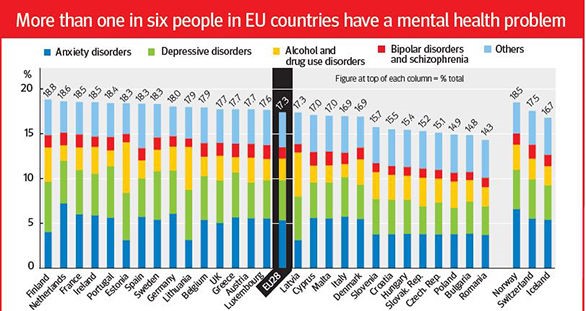
Such problems come at a high personal and social cost. Across EU countries, over 84,000 people died due to mental health problems or by suicide in 2015. Add to this people with mental health problems who die prematurely from physical causes, such as untreated chronic diseases. The overall costs related to mental ill-health in the EU-28 are estimated to have exceeded 4% of GDP, or more than €600 billion, in 2015. This includes both direct spending on health systems and social security programmes, and indirect costs related to the likes of lower employment and lower productivity. These are also conservative estimates, as they do not consider social assistance or work-injury benefits, or the fact that the costs of treating a physical illness tend to be higher if the patient also has a mental illness. Impacts on carers and co-workers have not been included either.
LEARN MORE
Top Psychiatry & Psychology Universities Worldwide:
Europe Universities:
University of Bristol | King's College London | University of Stirling | Robert Gordon University | Cardiff University | University of Essex | University of the Arts London | University College London | University of Kent | The University of Warwick | The University of Manchester |
